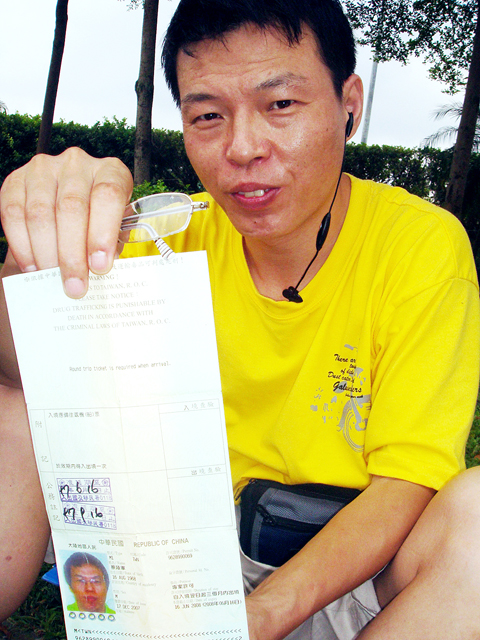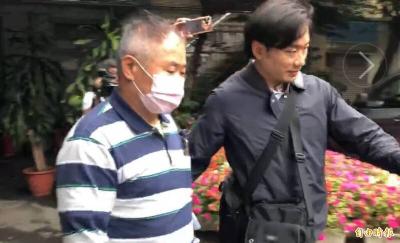A year ago, Chinese dissident Cai Lujun (蔡陸軍) jumped off a fishing boat to seek asylum in Taiwan, looking forward to a warm welcome and a new life.
But what greeted Cai was four months’ detention followed by an endless wait for asylum with no legal residence and a meager living subsidy.
Unable to work in Taiwan or seek asylum in a third country, Cai now regrets having defected to Taiwan.

“Had I known the outcome, even if I was to be beaten to death in China, I would never have come here,” he said recently.
Cai, 40, is one of the five Chinese pro-democracy activists who have arrived in the past four years seeking asylum.
During the Cold War, Chinese defectors were welcomed by Taiwan as “freedom fighters” with cash rewards.
Against the backdrop of warming relations between Taipei and Beijing, the recent arrivals have put Taiwan in an awkward position.
Adding to the complications is the fact that Taiwan has no asylum law and accepts Chinese defectors on a case-by-case basis, preferring to send them to a third country to avoid annoying China.
But no other country has offered to accept the five, as none wants to offend Beijing by accepting Chinese dissidents. Cai’s visits to the US and Canadian representative offices to seek asylum were fruitless.
The Mainland Affairs Council (MAC) has drafted an asylum bill, but it is still pending review by the legislature.
In limbo, a frustrated Cai said he asked MAC officials: “Do you regard me as a human being? If you regard me as a human being, why do you deny me basic human rights? Why don’t you grant me permanent residence?”
“Taiwanese are nice and kind, but the Taiwanese government is the lousiest government in the world,” he said.
Two international agencies — the UN High Commission for Refugees and Amnesty International — have refused to take up the five men’s cases.
Cai and Wu Yalin (吳亞林), 49, who defected to Taiwan in December after serving nine years in prison for criticizing the Communist Party, each receive NT$10,000 per month, which is barely enough to pay rent.
The other three dissidents — Chen Rongli (陳榮利), Yan Peng (燕鵬) and Yan Jun (顏軍) — each receive NT$20,000 per month because of different regulations at the time the stipend was granted.
The five have to renew their temporary residence permits every three to five months, also because of different rules at the time of their arrival in Taiwan.
“Without an ID card, we cannot look for work, go to school or even apply for a cellphone subscription,” said Wu, who worked as a mechanic.
The long wait for asylum in Taiwan and the difficulty in making a living is driving the Chinese defectors to desperate measures.
Cai, Wu and Chen Rongli said they would sue the government for violating their human rights by denying them legal residence.
“If this government does not care about losing face, why should I give face to it?” Cai said.
MAC Chairwoman Lai Shin-yuan (賴幸媛) said the council had urged the legislature to pass the asylum law as soon as possible and asked the five Chinese dissidents to be patient. The legislature is expected to review the draft bill in this session.
Professor Peng Huai-chen (彭懷真) from Tunghai University expressed sympathy for the defectors.
“The importance of Chinese defectors to Taiwan has decreased because of the change of ties between Taiwan and China, but for a democratic country, human rights should come first,” he said.
“If our government cannot grant them permanent residence now as the asylum law has not been passed, it should tell them how much longer they have to wait,” he said.

Taiwan would benefit from more integrated military strategies and deployments if the US and its allies treat the East China Sea, the Taiwan Strait and the South China Sea as a “single theater of operations,” a Taiwanese military expert said yesterday. Shen Ming-shih (沈明室), a researcher at the Institute for National Defense and Security Research, said he made the assessment after two Japanese military experts warned of emerging threats from China based on a drill conducted this month by the Chinese People’s Liberation Army’s (PLA) Eastern Theater Command. Japan Institute for National Fundamentals researcher Maki Nakagawa said the drill differed from the

A fugitive in a suspected cosmetic surgery fraud case today returned to Taiwan from Canada, after being wanted for six years. Internet celebrity Su Chen-tuan (蘇陳端), known as Lady Nai Nai (貴婦奈奈), and her former boyfriend, plastic surgeon Paul Huang (黃博健), allegedly defrauded clients and friends of about NT$1 billion (US$30.66 million). Su was put on a wanted list in 2019 when she lived in Toronto, Canada, after failing to respond to subpoenas and arrest warrants from the Taipei District Prosecutors’ Office. Su arrived at Taiwan Taoyuan International Airport at 5am today on an EVA Air flight accompanied by a

A 79-year-old woman died today after being struck by a train at a level crossing in Taoyuan, police said. The woman, identified by her surname Wang (王), crossed the tracks even though the barriers were down in Jhongli District’s (中壢) Neili (內壢) area, the Taoyuan Branch of the Railway Police Bureau said. Surveillance footage showed that the railway barriers were lowered when Wang entered the crossing, but why she ventured onto the track remains under investigation, the police said. Police said they received a report of an incident at 6:41am involving local train No. 2133 that was heading from Keelung to Chiayi City. Investigators

The Keelung District Prosecutors’ Office today requested that a court detain three individuals, including Keelung Department of Civil Affairs Director Chang Yuan-hsiang (張淵翔), in connection with an investigation into forged signatures used in recall campaigns. Chang is suspected of accessing a household registration system to assist with recall campaigns targeting Democratic Progressive Party (DPP) city councilors Cheng Wen-ting (鄭文婷) and Jiho Chang (張之豪), prosecutors said. Prosecutors yesterday directed investigators to search six locations, including the Chinese Nationalist Party’s (KMT) Keelung office and the residences of several recall campaign leaders. The recall campaign leaders, including Chi Wen-chuan (紀文荃), Yu Cheng-i (游正義) and Hsu Shao-yeh